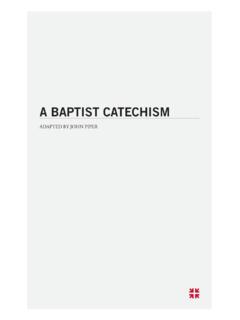Transcription of Biblical Exegesis - cdn.desiringgod.org
1 Biblical Exegesis Discovering the Meaning of Scriptural Texts By John Piper For more free resources, go to 1. Preface John Wesley once said, I have thought I am a creature of a day, passing through life as an arrow through the air. I am a spirit come from God, and returning to God, just hovering over the great gulf, till a few moments hence, I am no more seen; I drop into an unchangeable eternity! I want to know one thing the way to heaven, how to land safe on that happy shore. God himself has condescended to teach the way; for this very end He came from heaven. He has written it down in a book. O give me that Book at any price, give me the Book of God (from the preface of Sermons on Several Occasions by John Wesley, originally published in 1771). This Book has been costly. Martyrs wrote it and others have suffered intensely for their faithfulness to it. The book has been preserved and passed down through painstaking efforts.
2 It has been translated into the vernacular of thousands of peoples, sometimes at the cost of life, not to mention time, energy, and money. This Book is a treasure chest of holy joy. It is from this Book that we learn what the apostles taught concerning the ultimate sacrifice of the Son of God. It's from this Book that we learn about the supremacy of God in all things. It is from this Book that we learn about what our sovereign and good Father requires of us, his dependent children. If a rich uncle left his huge inheritance to the person named in his will, and you knew that you were that person, you would be very zealous to see that the court interpreted his will in a way consonant with the author's intended meaning. Or if you were desperately sick with a terminal disease, and you heard of a doctor who knew the cure, and he wrote down a health regimen for you, you would do everything in your power to understand what the doctor meant in his health regimen and do whatever the regimen called for.
3 How much more should we, like Wesley, regard the Word of God to be precious and most worthy of study! Because the Bible alone is the inerrant, infallible authority for what we are to believe about God and how he wants us to live, it is no surprise that we bring a lot of baggage to the text. By nature we don't like the thought of absolute authority residing in anyone outside of ourselves. What if God commands me to do something I don't want to do? Or what if he portrays himself in a way that differs from the way I think he should be? This would lead to a tremendous pressure to import our own meanings into the text rather than content ourselves with the author's intended meaning wherever it leads us. Thus, we need three things to be careful interpreters of the Word of God. First, we must admit we need help and that we will die without it. Left to ourselves, and our own unaided human reason, we are hopeless.
4 We need revelation from above. Our eternal life hangs on this! Secondly, we need faith in the sovereign goodness of the Author. This 2. faith not only frees us to go where the Bible leads us, but it impels us to go where the Bible leads us. It is, as Wesley said, the Book of God! Thirdly, we need to learn how to read with the kind of care that corresponds to the preciousness of the Book. In this pamphlet, John Piper passes on to us a way of reading the text that he learned from Daniel Fuller, Professor-Emeritus at Fuller Theological Seminary. There is nothing magical about this method. It is simply designed to help us slow down, let the author invite us into his world, and follow his train of thought. It teaches us how to discover the author's main point and to see how the other points illustrate or support the main point. As a young Christian at Bethel College, I had the privilege of taking several of Pastor John's courses (I knew him then only as Dr.)
5 Piper!) in which he coached us, proposition by proposition, through Romans, 1 Peter, 1 John, Ephesians, Luke and others. His passion was that we would see Reality for ourselves through the eyes of the Biblical writers. He didn't claim to see this Reality perfectly, he was (and is!) still very much in process. He didn't spoon feed us his conclusions, but helped us to reach our own and to see things he hadn't yet seen. I remember one time, when we were studying Romans 11:33-36, that the weight of glory from that text inspired the class to break forth spontaneously in singing the Doxology. Biblical theology leads to doxology! Upon graduation my appetite for understanding and applying the Word of God was whetted for more. It led me to spend the next two years being mentored by John's mentor. Daniel Fuller trembled under the privilege and responsibility of studying and teaching the Word of God like few people I have ever met.
6 Each word of God was precious; each proposition of Scripture was not merely a pearl on a string, but a link in the chain. And the study of this Book mattered. Eternity was at stake in how we understood and taught the Bible. There was no academic gamesmanship. We were blood earnest in our study. During the last 19 years, as a pastor at Bethlehem, I have sought to pass on to young and old alike, in one form or another, the method of Bible study taught in this pamphlet. Some people catch on more quickly than others, but all have pressed home on them the preciousness of the Word of God. As you read this pamphlet, may God increase your passion to study the Word of God for yourself and then to pass on what you learn to others. Tom Steller Pastor for Missions and Leadership Development Bethlehem Baptist Church, Minneapolis July 1999. 3. 1. Goals The Affections This is the man upon whom I will look, he that is humble and contrite in spirit, and trembles at my Word.
7 (Isaiah 66:2). It is an awesome thing to confess that in the Bible we hear the Word of God. And there is no hope for the exegete who never trembles in his trade; God has no regard for him, and he will come to nothing, though he write a thousand books. I believe that the Bible is God's Word. Therefore I must define the ultimate goal of Exegesis so as to embrace the heart as well as the head. The Scriptures aim to affect our hearts and change the way we feel about God and his will. The exegete, who believes that this aim is the aim of the living God for our day, cannot be content with merely uncovering what the Scriptures originally meant. He must aim, in his Exegesis , to help achieve the ultimate goal of Scripture: its contemporary significance for faith. It is the will of God that his Word crush feelings of arrogance and self-reliance and that it give hope to the poor in spirit. The Lord has given me the tongue of those who are taught, that I may sustain with a word him that is weary.
8 (Isaiah 50:4). Exegesis that does not sooner or later touch our emotions, and through us, the emotions of others, is ultimately a failure because it does not mediate the effect which the Scripture ought to have. Whatever was written in former days was written for our instruction, that by the steadfastness and encouragement of the Scriptures we might have hope. (Romans. 15:4). Therefore, Biblical Exegesis should be the intellectual enzyme that transforms the stupor of our worldly and futile affections into a deep and glad and living hope. Jesus said: These things I have spoken to you, that my joy may be in you, and that your joy may be full. (John 15:11). Biblical scholarship that does not share this goal works ill in two ways: by extinguishing in some people the flickers of affection with a frigid indifference and by alienating those whose candles will not go out. But neither of these is necessary if Biblical Exegesis is handled for what it really is, the cognitive catalyst that triggers a combustion of divine 4.
9 Joy in the human heart. Theology very quickly becomes idle chatter if it does not give birth in the heart to doxology. There is no reason why the most rigorous Biblical scholar cannot and should not say with Jonathan Edwards: I should think myself in the way of my duty, to raise the affections of my hearers as high as I possibly can, provided they are affected with nothing but truth, and with affections that are not disagreeable to the nature of what they are affected Of course, defining the ultimate goals of Biblical Exegesis in this way assumes that the exegete is convinced that the Scriptures do mediate truth. However, many exegetes do not share this conviction. The goal I have described so far does not apply to them. That is why I described it as an ultimate goal. There is a more immediate goal that I as an evangelical share with all good exegetes whether they believe the Scriptures are true or not.
10 We both want to understand and state accurately what the original Biblical authors willed to communicate. A person who has no vested interest in confessing the Bible's truth may be able, in any given case, to understand and restate the meaning of the original author as accurately as an exegete who believes the Bible is true. This is why we can make profitable use of Biblical scholarship from all sorts of people. I add this note to avoid confusion: the goals I am describing are those that I think should be set in view of my conviction of the Bible's truth. As such they are different from, yet overlapping with, the goals of exegetes who do not share this conviction. The Intellect I referred to Exegesis as an intellectual enzyme and a cognitive catalyst. This means that the exegete is inevitably somewhat of an intellectual. He is very much occupied with the life of the mind. The most obvious reason for this is that the truth he cherishes comes to him in a divinely inspired book.












